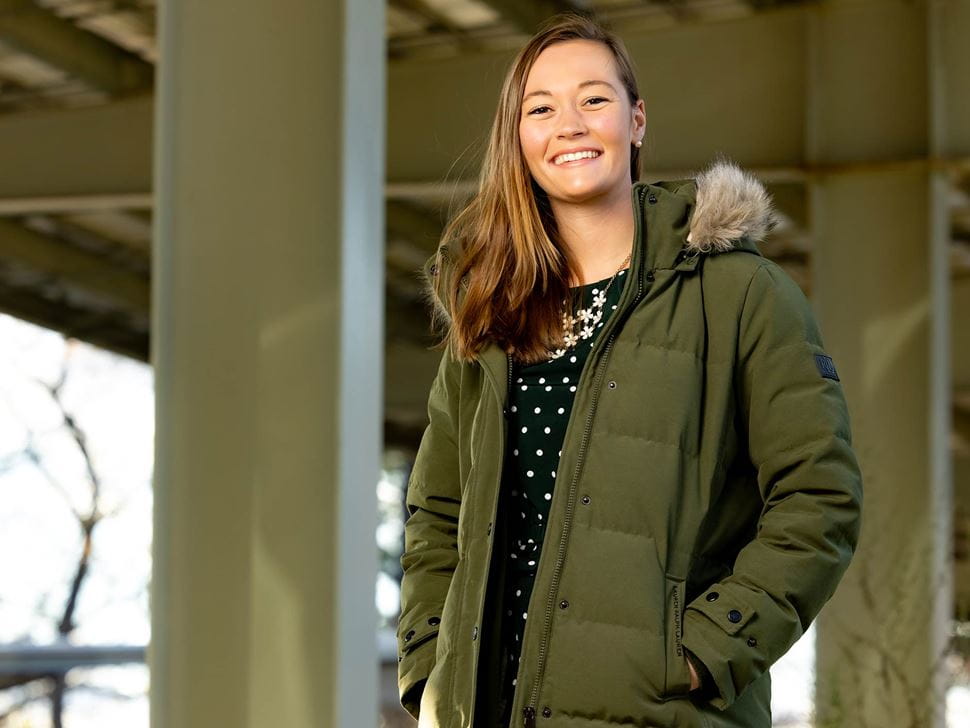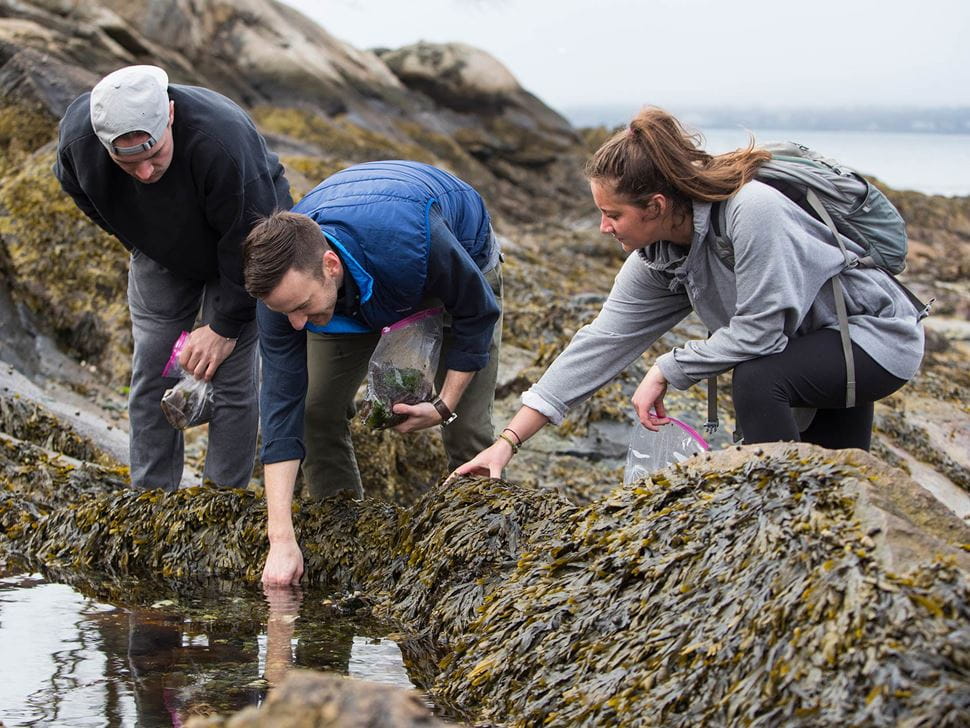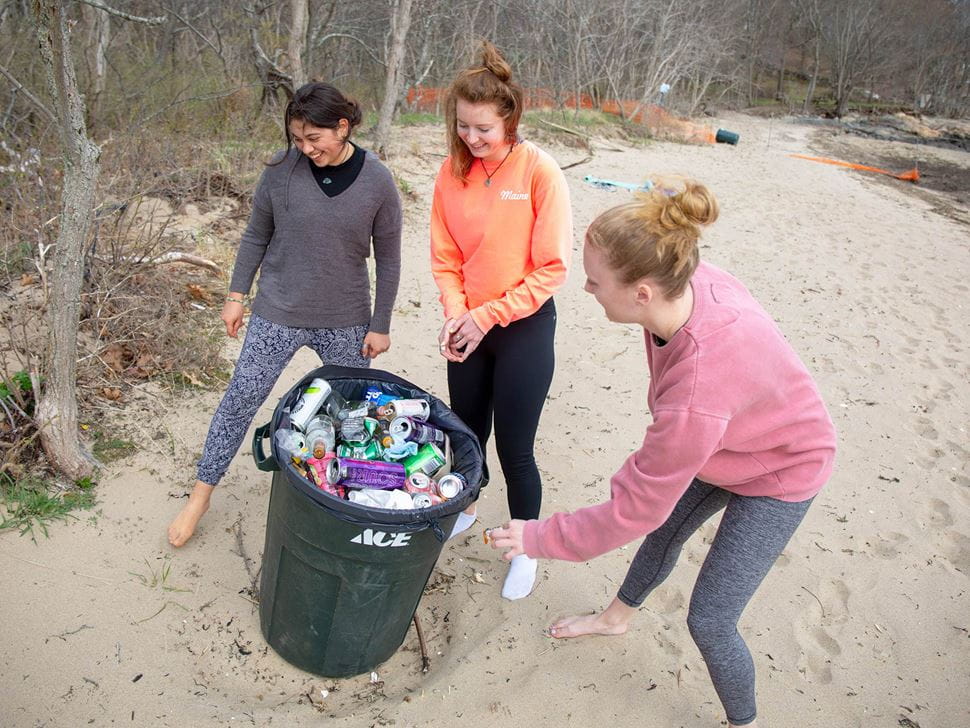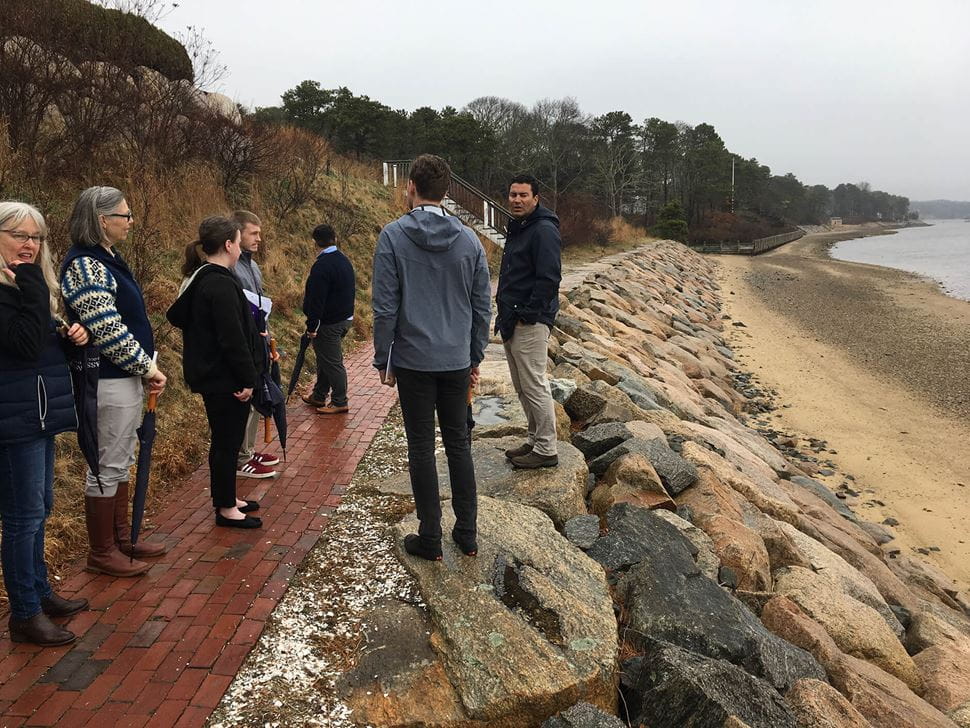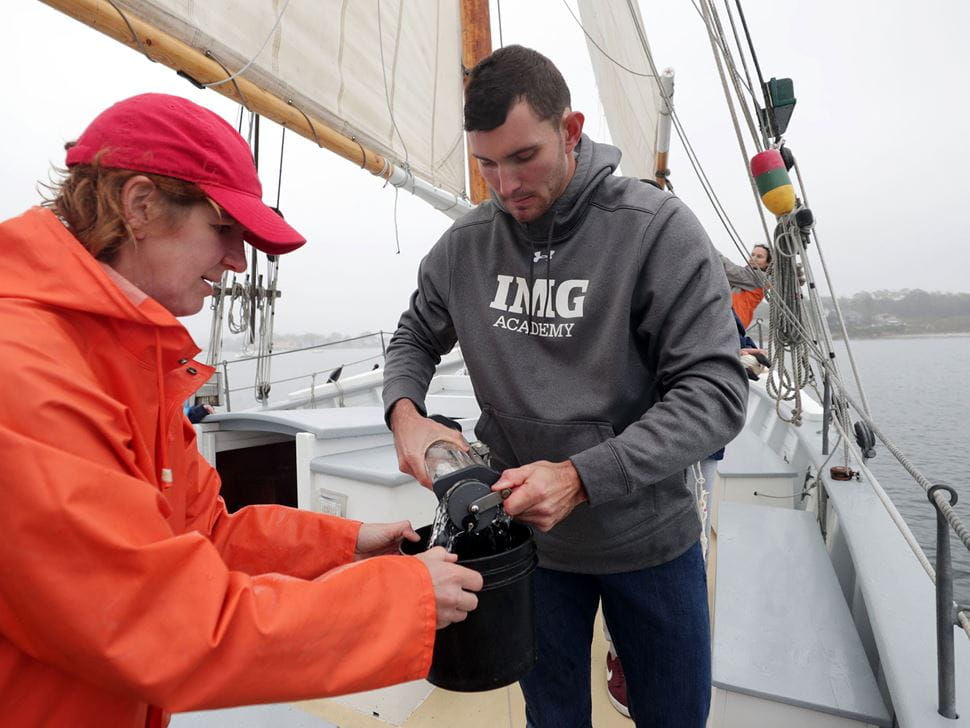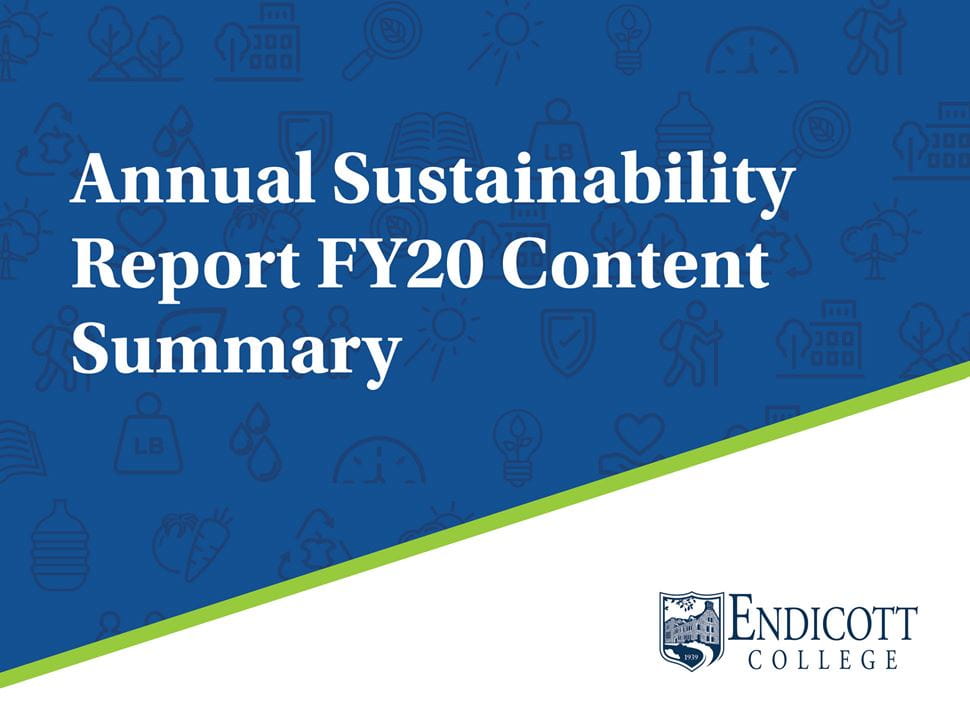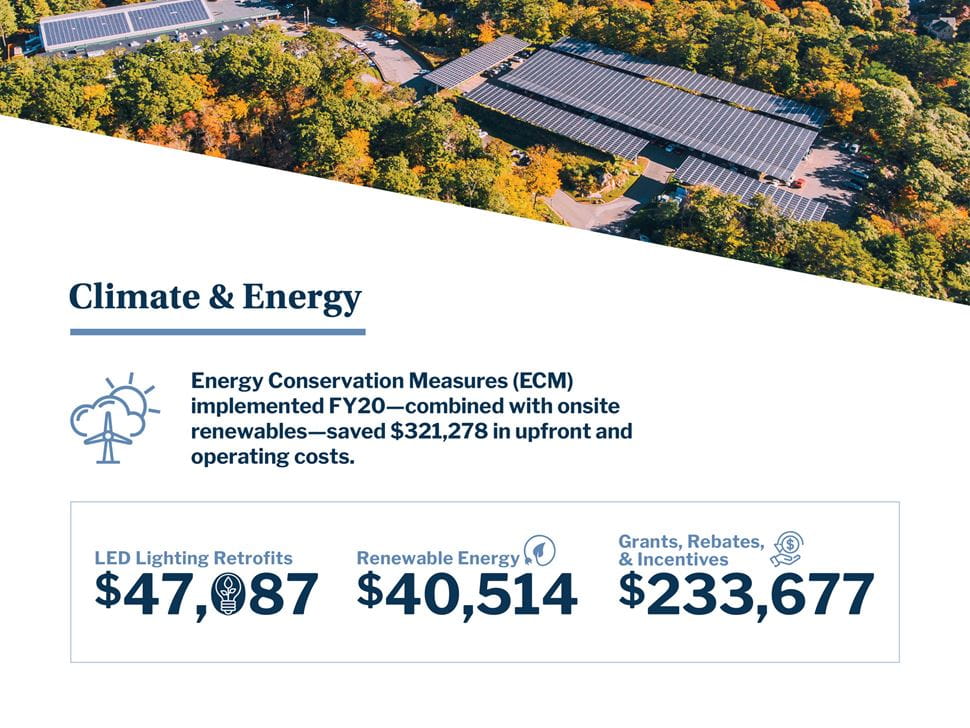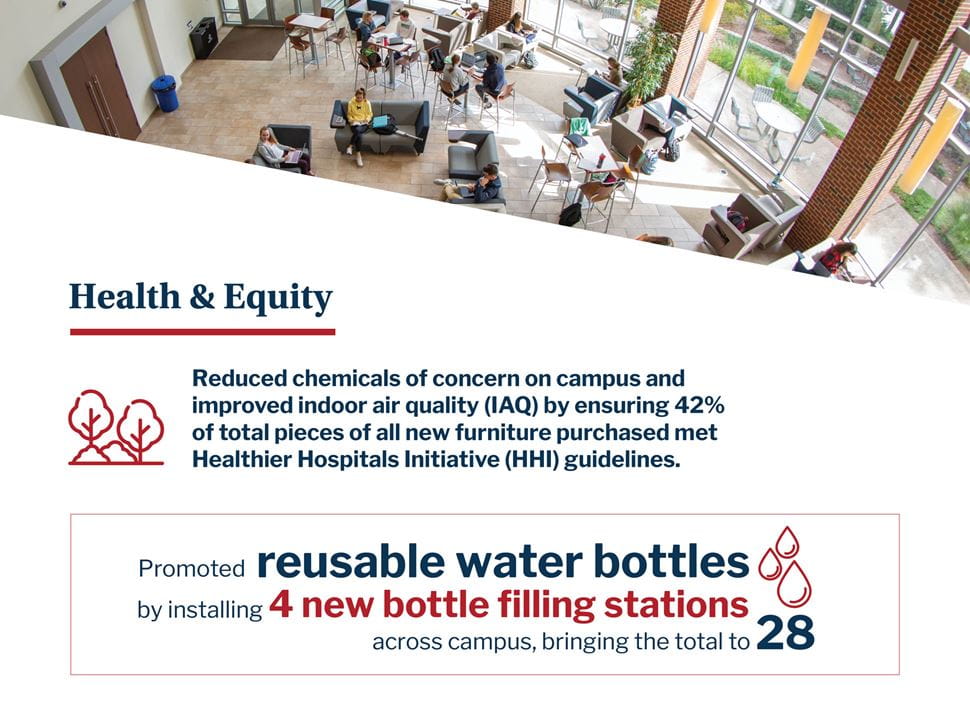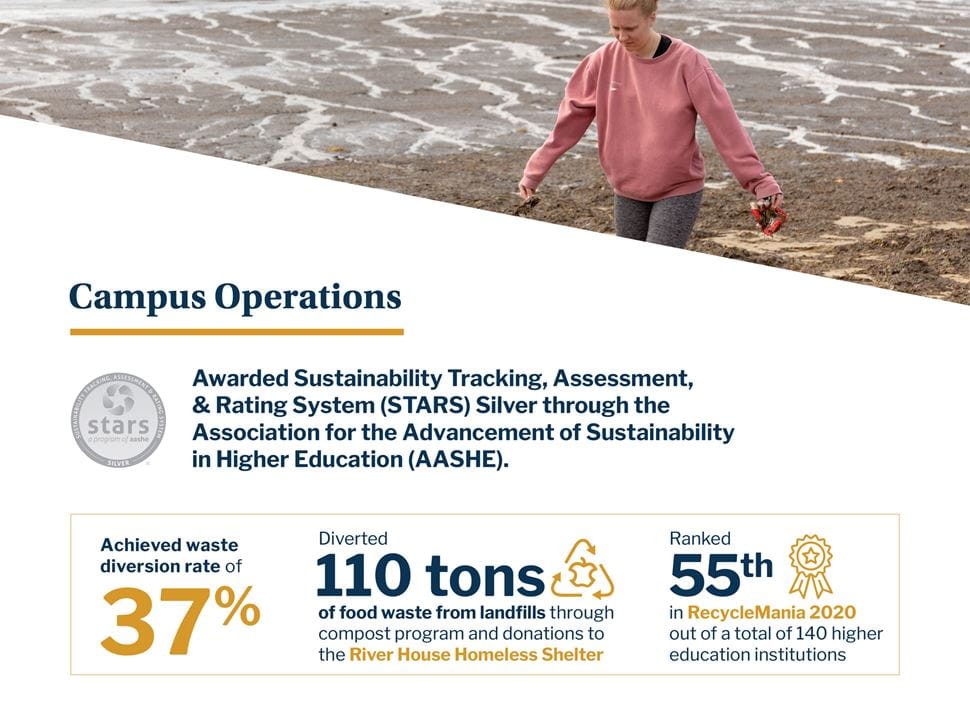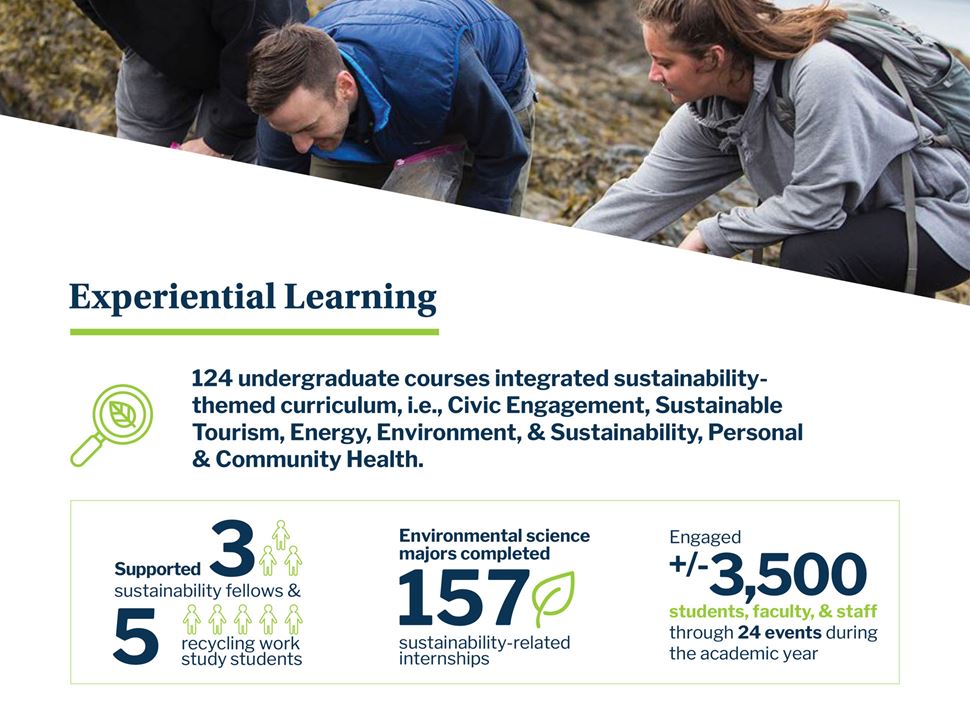Sustainability Initiatives
We are institutionalizing sustainable action College-wide with a focus on teaching and learning.
Endicott has one of the largest solar canopy parking lots in the Northeast, totaling nearly 1MW and providing 10 percent of the College’s electricity needs. There is an additional rooftop solar photovoltaic (PV) array on the Raymond J. Bourque Arena that provides around 10 percent of its electricity use, and new solar panels on the College's parking garage. Our composting, recycling, and waste management plan diverts more than half of materials from the waste stream each year, and is supported by an undergraduate student work-study program. An on-campus garden provides fresh vegetables for our dining hall and an opportunity for students to learn firsthand about growing and harvesting produce. Our new buildings and existing spaces are being designed and constructed or renovated with a focus on energy savings, water conservation, and healthy materials. Sustainable practices are evident in everything from the food we eat, the water we use, and the buildings and land where we work, live, and study.
-
Renewable Energy
- Endicott’s 1 MW solar canopy parking lot provides electricity to three residence halls- Stoneridge, Marblehead, and Bayview.
- The Raymond J. Bourque Arena has a 157 kW solar rooftop PV array, providing power to both the Hockey Arena and the Center for Nursing and Health Professions.
- New solar panels have been added to the College's parking garage, covering about 30% of the annual electricity use for the Wax Academic Center and Hempstead Commons.
- The College pursued a wind feasibility study and continues to review potential renewable opportunities on campus.
-
Green Building
- Buildings and infrastructure throughout campus have been retrofitted or are being constructed with energy-efficient LED lighting and controls.
- The Curtis L. Gerrish School of Business and Ginger Judge Science Center is a model of green design with lighting, temperature control, ventilation, and water fixtures to maximize efficiency.
- Endicott was awarded the MassCEC grant under the Commercial-Scale Air-Source Heat Pump Program for the implementation of a VRV system in the new academic center.
- A green roof is located on the Walter J. Manninen Center for the Arts, which serves to absorb and treat stormwater, reduce the urban heat island effect, and provide green space.
-
Climate Preparedness and Campus Resilience
- A seawall is located at Endicott Beach, one of Endicott’s three private beaches, to protect a portion of campus.
- Stormwater discharge is slowed through the campus lakes and rain gardens.
- Permeable pavement was utilized in the newest parking lot to limit runoff into surrounding sensitive area.
- Endicott is exploring generator and CHP options for a central building to function as an emergency response center.
- The City of Beverly, Mass., and Endicott are working to understand coastal resiliency and climate vulnerabilities.
Health and Equity
Students, staff, and faculty interact with our campus and local surroundings daily. We have a key role in ensuring their personal well-being and health. Whether it is the opportunity to explore the campus through hiking trails, offering sustainable food options, or incorporating healthy materials into our indoor spaces, helping to create a healthy community is vital.
-
Wellness
- The counseling center on campus is open to students, faculty, and staff.
- The College has been consistently rated one of the top places to work in higher education in the region.
- Endicott’s three miles of trails offer a great place to explore. Witch Lane provides a relaxing and educational hike with glimpses of large rocks scraped up from the Laurentide Ice Sheet and human-caused forest succession.
- Faculty and staff receive free access to athletic facilities on campus.
-
Food and Dining
- Endicott partners with Sodexo to offer complete vegetarian options for every meal.
- We use sustainably harvested Red’s Best fish, fair-trade coffee and tea, and a large percentage of our produce comes from local sources.
- Students and staff manage two raised beds on campus, where they tend to the garden and harvest produce, including cherry tomatoes, kale, lettuce, cucumbers, garlic, carrots, beets, radishes, sage, basil, cilantro, parsley, rosemary, and thyme.
- In 2010, we started a tray-less program in the dining hall and reduced food waste by 30 percent.
- Since 2012, we have eliminated the use of thousands of Styrofoam containers through the use of reusable to-go containers. Students who wish to take out food can provide a deposit for a reusable container, and they can return the used container for a clean one on their next visit.
-
Healthy Materials
- Endicott is expanding the use of green cleaning products and technologies.
- Endicott is exploring pilot opportunities to purchase furniture that complies with the Healthier Hospitals Initiative Safer Chemicals Challenge: Healthy Interiors.
- Materials utilized during new construction and renovations are reviewed.
Campus Operations
As part of the College’s Physical Plant, we will work to enhance our facilities and operations in a manner that conserves resources and reduces waste. We will work to institutionalize operations and improve our community’s health while reducing our impact on the climate.-
Procurement
- We partner with the College’s business office and outside vendors to review options and prioritize sustainable purchasing.
- College-wide procurement guidelines are being developed.
- Endicott uses Sustainable Forestry Initiative certified copy paper and FSC certified paper and soy inks for College publications.
- Biodegradable supplies are utilized for some automobile repair products.
-
Transportation
- We encourage students to consider using Zipcar, a shared car program available on campus and located on level 5 of the parking garage. Endicott students can create a membership account and register Endicott as their location to receive a discount off the monthly fee.
- Bike racks are located throughout campus, and there are three miles of trails for recreation.
- Endicott is located near historic Cabot Street, which is lined with restaurants and shops.
- The Massachusetts Bay Transportation Authority (MBTA) makes it easy to travel around the region, and Endicott is a short ride to the Beverly Depot where you can take the commuter rail (https://www.mbta.com/schedules/CR-Newburyport/timetable) into Boston.
- We provide daily shuttles from our main campus to downtown Beverly, local malls, and the commuter rail. This off campus shuttle service, also used for some special events, is run by Joseph's Transportation, who has partnered with One Tree Planted to plant a tree for every 100 miles driven!
- We provide six electric vehicle (EV) charging stations on campus, located on the ground floor and levels 2 & 3 of the campus parking garage.Only EVs are allowed to park in these spots, and can charge at a low rate of $0.50/hour.
-
Landscaping and Grounds
- Fifteen percent of the campus is organically landscaped, paying special attention to areas like our beaches and the Endicott Lakes.
- Our staff and volunteers are always working to fight back invasive plants with natural methods, as well as native plant species wherever possible.
- In 2014, 3,000 ladybugs were released into the first College greenhouse to combat aphids.
- Our campus features apple trees, pear trees, and two raised beds that provide herbs and vegetables to the dining hall.
- Compost from the dining hall is used in the garden beds, creating a full circle food production.
-
Water
- Low-flow fixtures are utilized across campus to reduce water use.
- 40 filtered water bottle fill stations across academic, administrative, and residence buildings provide an alternative to single use water bottles. This program will continue to expand until each building on campus has at least one water bottle fill station.
-
Waste Reduction and Recycling
- Single-stream recycling is in place campus-wide.
- Food waste is composted at all dining locations.
- We are piloting undergraduate composting in residence halls.
- Electronic waste is collected across campus and sent to a local R2 Certified facility.
- Used tires are collected and repurposed for local communities.
- Up to 94 percent of construction waste is diverted from landfill for projects on campus.
- Books are collected and donated through Better World Books.
- The first Cradles to Crayons donation bin located on Massachusetts’ North Shore is hosted on campus. This bin, along with a Red Cross bin, are located in Lot 28 to facilitate reuse and recycling of textiles.
- The College Cleanse Move Out Donation Collection initiative recovers between 5,000-8,000 lbs of items donated for reuse at the end of each academic year. These items- books & school supplies, non-perishable food, clothing & shoes, and dorm supplies/housewares- are then donated to local shelters, thrift stores, and community organizations, both giving the items new life by diverting them from the landfill while providing needed resources and items to people in the community.
- Learn more about traditional and specialty recycling, as well as composting, at Endicott on our Recycling at Endicott page.
Look for these signs around campus:
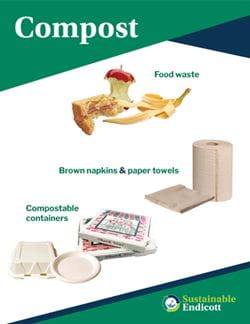
.jpg?h=324&w=250&hash=A8D2F791800918DCBB2AB2624F60B159)
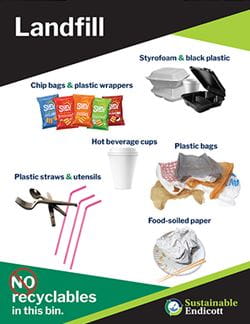
Experiential Learning
Following the mission of the College, we will work to develop and support firsthand opportunities for student involvement. We will drive student engagement that utilizes the campus and surrounding community as a living lab.-
Courses and Curriculum
- The department supports student research projects and thesis work.
- We integrate sustainability across disciplines and work with faculty and deans to develop programs.
- Further educational opportunities are provided through guest lecturers in environmental science courses.
-
Student Involvement
- Student Sustainability Fellows are hired to help develop and implement initiatives and programs focused on procurement, athletics, student activities, and dining. These students help the Office of Sustainability with important tasks such as data entry and analysis, communications and outreach, programming, research and DEIB incorporation, and waste management.
- Work-study students assist with recycling collection across campus.
- We partner with the student-led Endicott Environmental Society, the Sunrise Movement Club, and the Beekeeping Club.
-
Internship
- Student sustainability work is highlighted.
- The department is a resource for students during their internships.
- Living lab opportunities are provided to apply learned skills in settings on campus and in the local community.
- Partnerships are developed with likeminded organizations.
- The Office of Sustainability highlights a selection of interesting jobs and internships related to sustainability on our website below, as well as in our monthly newsletter, to expose students to the wide variety of careers available in sustainability to students of all majors.
Sustainability Jobs and Internships
Sustainability is an inherently multi-disciplinary field. At the Office of Sustainability, it is our goal to connect students to meaningful job and internship opportunities that cater to their specific interests while supporting sustainable development.-
Internships
Title Application deadline Description Rolling Seaside Sustainability internships are 5 months long and require a 15 hour per week minimum work schedule. The following teams are available for applications: business operations, climate action, environmental justice, grant writing, green scholars, human resources, legislations and advocacy, marine science and technology, marketing, podcasting team, sustainability consulting, web development, and technology. Neighbor to Neighbor Rolling Neighbor to Neighbor Massachusetts is a power-building and grassroots organizing group that is dedicated to making democracy work for all. Environmental Justice is just one of many focuses N2N takes on. Neighbor to Neighbor is very willing to take on interns and is very flexible both in terms of hours and role opportunities. Contact Gabriel Cohen-Gilnick at gabe@n2nma.org or by phone at 401-603-6058 for more information. Student PIRGs Internships Rolling Student PIRGs are actively looking for campus internships. This entails giving students the opportunity to take their education out of the classroom and do hands-on work to make an impact on causes they're passionate about. Current campaigns for student PIRGs include but are not limited to, 100% Renewable Energy campaign, Break Free From Plastics campaign, Stop the Overuse of Antibiotics on Factory Farms campaign, Save the Bees campaign, and the Zero Hunger campaign. Interns are eligible to get course credit in a variety of departments depending on your campus. Oceantic Network Internships 03/10/2024 The Oceantic Network is offering a wide range of internship positions for summer 2024. These positions include Communications, Digital Tools, Education & Training, Events & Programs, Graphic Design, Policy, and Supply Chain & Research. Ideal candidates will have excellent communication and writing skills and should have keen attention to details. An interest in offshore wind and ocean renewable energy is required. The program is open to rising college seniors, recent graduates, and students in masters programs. Undergraduate interns will be paid $17 per hour. Graduate interns will be paid $20 per hour. Applications are due by March 10th 2024. Summer 2024 Marine Science and Education Internship Program Rolling Seaside Sustainability is offering a plethora of in-person internships that vary in subject matter and responsibilities. The following topics are offered for the summer 2024 internship period: Seabin and Skimmer Management, Marine Debris Trawls, Nurdle Patrol, Compostables in Marines Environments, Sunscreen Dispensers, Microplastics in Sand, Mudflat Acidification Testing, PixiDrone, Company Coastal Cleanups, Independent Coastal Cleanup, BeBot, and Green Crabs. Seaside Sustainability is seeking 7 in-person interns to complete a minimum of 15 hours per week from June 1st, 2024- October 15th, 2024. Requirements include passion and dedication for making a difference in the environment, good communications skills, good time management skills, willingness to work outdoors, on a boat, or in and around water, and the ability to lift 50 pounds. -
Jobs
Title Application deadline Description Green Corps Organizer Program Rolling Green Corps is looking for several environmental organizing employees. Chosen candidates will be trained on large issues facing the environment and how to organize and strategize awareness campaigns. The first year is broken down into two portions; training for organizing, and then organizing and running 3-5 campaigns. Positions beginning in August 2024 and will have an annual compensation of $32,500 through $39,000 depending on location. Benefits include paid sick leave, vacation time and need-based student loan assistance. Development & Events Associate for Sustainable Marblehead Rolling Sustainable Marblehead is looking to hire an energetic, creative, and responsible person with event management experience to assist the Executive Director. The ideal candidate will have proficiency in Word, Excel, Google Docs, and Sign Up Genius as well as excellent verbal and written communication skills. The primary responsibilities of this position include assisting working group leaders, contacting stakeholders outside of the organization, executing development activists, contacting potential sponsors, organizing outreach, and suggesting new ideas.
This role requires about 5-10 hours per week and meets primarily during the day with some weekend and evening hours depending on the events schedule. This is a contract position and compensation is on an hourly basis. This is a work from home position with in-person presence required at some Marblehead events. Interested candidates should send a cover letter and a resume to sustainablemarblehead@gmail.com
Dartmouth Natural Resources Trust Inc. - Land Steward Rolling The DNRT seeks a full-time Land Steward with a passion to preserve and protect natural resources. The Steward would work under the Land Manager to support a broad range of land management activities on improving the ecological health of the DNRT properties. The Steward will also assist in creating and updating Baseline Documentation Files, Inspecting Conservation Restrictions, and organizing and overseeing volunteer groups. The qualified candidate will have a bachelor’s degree in environmental science or other biological sciences. Excellent written and verbal skills, competency and comfort with ArcGIS mapping software, general knowledge of local flora, fauna, and ecological processes, and experience using light carpentry tools are all preferred qualifications. This position requires strenuous physical work: frequent standing, bending, twisting, and hiking. This is an entry level, full-time position with a starting annual salary range of $48,000-53,000 depending on experience and qualifications. Assessment Coordinator - University of North Carolina Charlotte 03/15/2024 The Office of Sustainability at UNC Charlotte is looking to hire an assessment coordinator to provide coordination of data gathering, information management, and reporting for assessment of campus sustainability. The chosen candidate will have advanced proficiency with spreadsheet and database software, and experience with metrics tracking across sustainability topic areas such as climate, energy, water, waste, transportation, and purchasing. The ideal candidate will be able to start on April 8th, 2024. Salary ranges from $41,028-$51,285.
